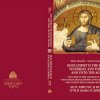Cape Town Fine Music Radio, June 14, 2017
Host Program: Dragana Jevtovic
Audio MP3: Download
Culture or civilization is human creativity that aspires towards transcendence through created symbols and means. The Church is culture par excellence because the Liturgy is a cultural event that sanctifies every human creation and institution: painting, architecture, music, education, philosophy, poetry, social and political institutions and religious sentiment.




